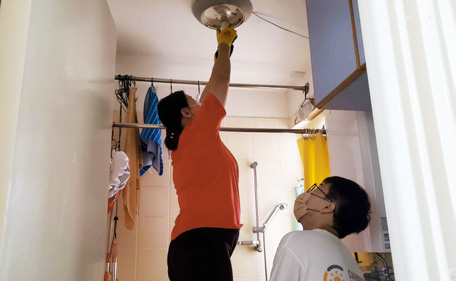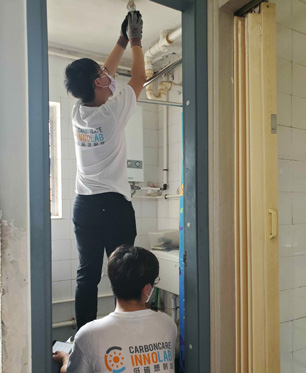Wai-fong came to know Granny Chan when visiting partitioned cubicle homes in Kwai Chung, in Northeast Hong Kong. A warm-hearted volunteer in the Kwai Chung Energy Care Community Action Network, established by CarbonCare InnoLab, she listened to what Granny Chan needed. After replacing high-energy light bulbs with LEDs, Wai-fong also left her telephone number, in case Granny Chan needed her again.
Local Partners, Local Volunteers
To address climate change, PCD’s approach has been to link ecology, climate, and community engagement. Since 2021, we have supported the Kwai Chung EnergyCare Community Action Network with our partner CarbonCare InnoLab (CCIL) to improve energy efficiency, raise awareness, and explore community action on climate change adaptation. CCIL has been working since 2014 to enhance public capacity in responding to climate change and to promote low-carbon living. Its current project site, Kwai Chung, has a substantial proportion of low-income residents, including working poor, ethnic minorities, and new arrivals from mainland China. More than 8,000 families live in unhygienic partitioned cubicles, with unhealthy air quality, indoors and out.
CCIL partners with several NGOs in Kwai Chung. Health in Action addresses the wellbeing of elderly people and has an extensive volunteer network, including of ethnic minority members. HKSKH Lady MacLehose Centre, rooted in the community for decades, helps with identifying residents in need. Community Leap works in waste reduction: they train volunteers in repairing and maintaining appliances, while CCIL covered the training in climate change, energy poverty, energy-saving, and how to conduct home visits. Who volunteers? Mostly cubicle residents, students, retirees, and homemakers, some having received project support themselves. So far, 31 volunteers have been trained and they are all vital in outreach with residents.

Volunteers of various backgrounds–including cubicle residents, retirees,
and homemakers–build supportive relationships with fellow residents.
A Low-Carbon Community is Possible!
Supported by CCIL, volunteers have been conducting home visits with local partners and technicians. They see that elderly singletons, and cubicle residents in particular, face many challenges. With infestations of cockroaches and rats, they rarely open up their tiny windows for air; and with fluorescent lighting, indoor temperature is high, as are electricity bills. When volunteers installed LEDs, there have been positive changes. Kwai Chung resident Ms. Wu is happy with the better lighting for her daughter’s studies, and other residents are happy to save about $200 on each electricity bill.
Residents also have better indoor air quality now. Professor Albert Ko of Lingnan University’s Lingnan Entrepreneurship Initiative joined in and designed an air purifier that filters out 90% of particulates. Energy-efficient, portable, and USB-rechargeable, it’s also easy to assemble and operate: secondary school volunteers help assemble it, and residents can easily change the filter. In all, 20 families in Kwai Chung switched to low-carbon, energy-efficient devices in 2021.

Volunteers train to be champions of low-carbon living–they gain professional skills,
and learn about climate change, climate justice, climate poverty, and climate action.
Along the way, residents have been learning, and empowering themselves. Elderly singleton Ms.Fong, for instance, decided to join an appliance repair workshop after volunteers fixed her kitchen fan. Other residents have attended air purifier DIY workshops, increasing their confidence and know-how. Through these hands-on experiences, they’ve also been seeing the links with climate change. To consolidate this, the CCIL project team has hosted eco-tours, talks on renewable energy, electricity bill management, workshops on low-carbon living, and a family-oriented beach-cleaning during the pandemic. Kwai Chung children happily learned about ways to keep the oceans and the climate healthy. An online community platform is in progress too, hoping to weave a mutual help and information- sharing network on carbon reduction and wellbeing.
As a local partner puts it, the goals of low-carbon living may feel remote at first, yet as residents see the project’s practical effects, climate change has become a heartfelt concern. The new network in Kwai Chung is comprised of many innovative hands, and together, they believe that more innovative actions and adaptations are possible.

